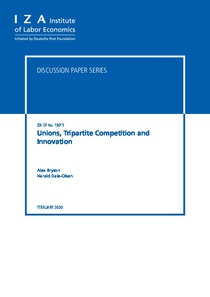Unions, tripartite competition and innovation

Bryson, Alex ; Dale-Olsen, Harald
Institute of Labor Economics, Bonn
IZA - Bonn
2020
36 p.
collective bargaining ; trade union ; innovation
Discussion Paper
13015
Collective bargaining
English
Bibliogr.
We present theoretical and empirical evidence challenging results from early studies that found unions were detrimental to workplace innovation. Under our theoretical model, which extends the Cournot duopoly innovation model, local union wage bargaining is more conducive to innovation - particularly product innovation - than competitive pay setting. We test the theory with workplace data for Britain and Norway. Results are consistent with the theory: local union bargaining is positively associated with product innovations in both countries. In Norway, local union bargaining is also positively associated with process innovation."
Digital
The ETUI is co-funded by the European Union. Views and opinions expressed are however those of the author(s) only and do not necessarily reflect those of the European Union or the ETUI.